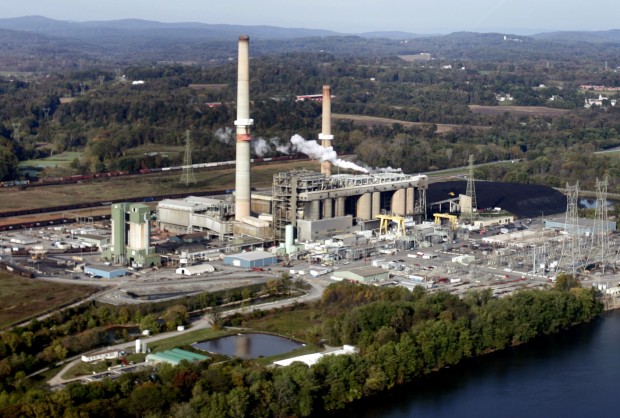House approves budget bill with controversial energy provisions
-
Marie Cusick

Carolyn Kaster / The Associated Press
PPL’s Brunner Island coal-fired plant on the west bank of the Susquehanna River. A bill recently approved by the state House would give legislators more time to review Pennsylvania’s compliance with federal climate change policy.
The Republican-controlled state House approved a budget bill Tuesday that has drawn criticism from Democrats and environmental groups over language that affects new oil and gas regulations and federal efforts to combat climate change.
The fiscal code acts as a set of instructions, directing money for the overall state budget. Last month it was approved by the state Senate after amendments were added to increase the length of time legislators have to review Pennsylvania’s compliance with the federal Clean Power Plan– the central part of President Obama’s climate change initiative.
Pennsylvania has to submit a plan to curb greenhouse gas emissions to the EPA by September. A 2014 state law gives legislators 100 days to review the plan before it goes to Washington. The new fiscal code bill would give them 180 days. House GOP spokesman Steve Miskin says he doesn’t understand why environmental groups object.
“They’re trying to make an issue of something that’s not an issue,” he says. “It’s just weird. It’s more public review. I’m not sure how that’s a bad thing.”
Larry Schweiger is president and CEO of the environmental advocacy group, PennFuture. He says this bill is part of a broader, national effort by the fossil fuel industry to slow or stop tighter environmental regulations.
“This is not happening in a vacuum. The industry is pushing to block progress on climate,” he says. “Pennsylvania is the third largest emitter, and we have a lot to do with the way this program will end up.”
The fiscal code also contains language aimed at blocking the DEP’s efforts to finalize new regulations for oil and gas drilling. The regulations have been controversial, particularly among the conventional oil and gas industry, which views itself as unfairly lumped into a regulatory structure targeted at the newer, unconventional Marcellus Shale industry.
The bill would also shift $12 million away from the state’s Alternative Energy Investment Act to expand natural gas infrastructure.
“Every time we’ve done stuff with alternative energy, it’s turned into a funding guzzler,” says Miskin. “This is taking advantage of our resources, to maximize the investment and safe usage of natural gas.”
Last year Governor Tom Wolf’s budget proposal contained a similar initiative. He wanted $25 million to go towards so-called “last mile” natural gas distribution lines to connect manufacturers to the cheap, abundant fossil fuel. However it would have been funded through issuing bonds and paying the interest with a natural gas severance tax.
“I don’t agree with [Wolf’s plan] but taking money from clean energy and moving it to natural gas is even more egregious,” Schweiger says of the fiscal code. “We should not be encouraging the further use of fossil fuels when it’s clear we’ve already passed some dangerous markers in our climate system.”
The bill now goes back to the Senate, which meets again next Tuesday. Given ongoing state budget impasse, it’s unclear what Wolf will do if it lands on his desk.
“He’ll probably throw a temper tantrum and have a hissy fit,” says Miskin, referring to a recent press conference during which Wolf called the GOP budget he’d received “garbage,” before vetoing parts of it.
“Loading up the fiscal code with language that tries to gut oil and gas regulations or climate change efforts is just wrong,” says the governor’s spokesman, Jeff Sheridan. “The political posturing is not productive.”
















